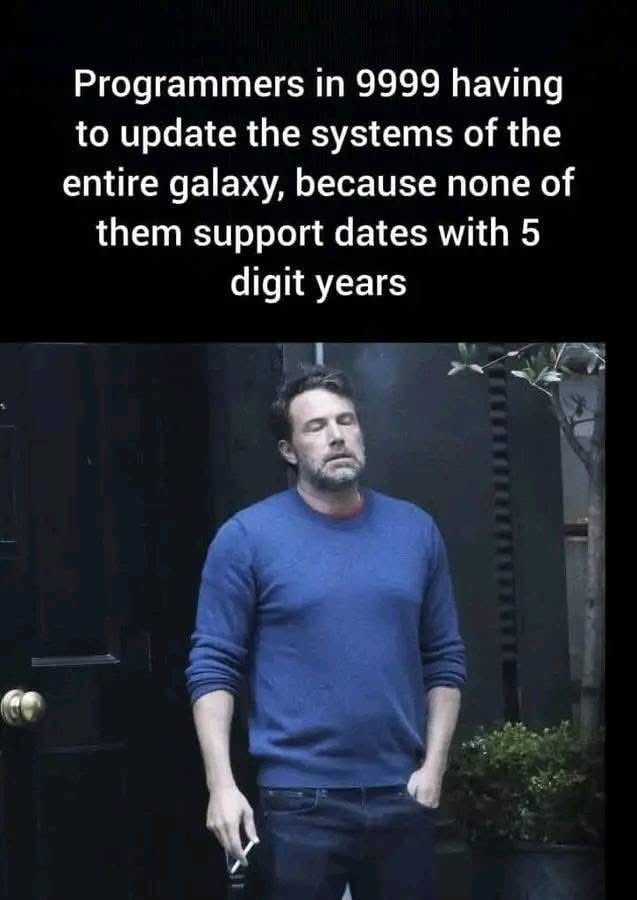Programmers in 292,271,023,045 after uint64_t isn't enough for the unix timestamp anymore:
memes
Community rules
1. Be civil
No trolling, bigotry or other insulting / annoying behaviour
2. No politics
This is non-politics community. For political memes please go to [email protected]
3. No recent reposts
Check for reposts when posting a meme, you can only repost after 1 month
4. No bots
No bots without the express approval of the mods or the admins
5. No Spam/Ads
No advertisements or spam. This is an instance rule and the only way to live.
A collection of some classic Lemmy memes for your enjoyment
Sister communities
- [email protected] : Star Trek memes, chat and shitposts
- [email protected] : Lemmy Shitposts, anything and everything goes.
- [email protected] : Linux themed memes
- [email protected] : for those who love comic stories.
Programmers dealing with the timezones of asymmetric period binary and trinary star systems once we go interstellar 💀
Please no.
Don't worry, we'll be extinct soon, hopefully. Maybe even before int32_t runs out. Unfortunately not soon enough to stop the humans impact on earth before the worst damage is done.
well there have been mass extinctions before, the most notable maybe oxygenation catastrophe , mainly caused by photosynthetic life.
And it represented a major breakthrough for life on Earth, so i doubt that this one is an irreparable crisis.
I don't think 10000 year is a problem. There is a real "year 2038 problem" that affects system storing unix time in signed int32, but it's mostly solved already. The next problem will be in year 33000 or something like that.
There are so many problems there is an entire Wikipedia page dedicated to them.
Yes, there are random systems using every kind of smart or brain-dead option out there.
But the 2038 problem impacts the previous standard, and the current one will take ages to fail. (No, it's not 33000, unless you are using some variant of the standard that counts nanoseconds instead of seconds. Those usually have more bits nowadays, but some odd older systems do it on the same 64 bits from the standard.)
Well, I looked at a Year 10000 problem less than 2 hours ago. We're parsing logs to extract the timestamp and for that, we're using a regex which starts with:
\d{4}-\d{2}-\d{2}
So, we assume there to be 4 digits for the year, always. Can't use it, if you live in the year 10000 and beyond, nor in the year 999 and before.
Just start over at year 0000 AT (after ten thousand)
It’s a UX problem rather than a date format problem at that point. Many form fields require exactly 4 digits.
It's going to be significantly more than the year 33000 before we run out of 64-bit epoch timestamps.
The max value for signed 64-but epoch values is more than 292 billion years away, or 20 times the age of the universe itself.
So yeah, we're basically solid forever with 64-bit
There might be a new calendar year system by then. Probably some galactic dictator who says that the beginning of their rule is now Year Zero.
Year Zero of the Glorious Zorg Empire!
Lol China used to use "Year 1" right after Xinhai Revolution.
Its "民国" (ROC) followed by the year number
Example: 民国一年 ROC Year One (aka 1912)
(ROC stand for Republic of China, btw)
Then the communists kicked the KMT out, and I think the ROC government in exhile in Taiwan stopped using it.
Praise Vectron!

Good news! We'll be exctinct long before this happens. One less thing to worry about!
Seems hyperbolic to assume we will be extinct by 9999.
Sure we’re heading for a climate crisis, but I don’t think all humans will be dead; Just the poorest.
That has forever been the fallacy.
The poor won't die in the apocalypse leaving only the rich behind. The poor will die, and the rich will be faced with the harsh reality that they needed an army of poor working under them to sustain themselves, leading them to all die within the generation.
Y10K.
The trick is to unplug our computer a few seconds before midnight on December 31st, 9999 and then plug in the wire again
In 9999, this meme will be problematic because it assumes the entire galaxy conforms to an Earth-based calendar system.
Well the USA is on Earth so obviously the earth calendar is the default.
Nah, they will do what they always do. Change some system environmental variables to move the zero date on till after they would have retired.
Nobody wants to touch the original code, it was developed in the 1970s
Look at this fucking piece of shit code, oh right, it's been written by a homo sapiens sapiens. No wonder they collapsed soon after.
oh just start at 0000 again, signate that as 10,000. Files didn't start until like 1979 anyways, and there can't be many left, and even if it is a problem, now you have 2000 years to not worry about it.
In this thread: mostly people that don't know how timekeeping works on computers.
This is already something that we're solving for. At this point, it's like 90% or better, ready to go.
See: https://en.m.wikipedia.org/wiki/Year_2038_problem
Time keeping, commonly, is stored as a binary number that represents how many seconds have passed since midnight (UTC) on January 1st 1970. Since the year 10,000 isn't x seconds away from epoch (1970-01-01T00:00:00Z), where x is any factor of 2 (aka 2^x, where x is any integer), any discrepancies in the use of "year" as a 4 digit number vs a 5 digit number, are entirely a display issue (front end). The thing that does the actual processing, storing and evaluation of time, gives absolutely no fucks about what "year" it is, because the current datetime is a binary number representing the seconds since epoch.
Whether that is displayed to you correctly or not, doesn't matter in the slightest. The machine will function even if you see some weird shit, like the year being 99 100 because some lazy person decided to hard code it to show "99" as the first two digits, then take the current year, subtract 9900, and display whatever was left (so it would show the year 9999 as "99", and the year 10000 as year "100") so the date becomes 99 concatenated with the last two (now three) digits left over.
I get that it's a joke, but the joke isn't based on any technical understanding of how timekeeping works in technology.
The whole W2k thing was a bunch of fear mongering horse shit. For most systems, the year would have shown as "19-100", 1900, or simply "00" (or some variant thereof).
Edit: the image in the OP is also a depiction of me reading replies. I just can't even.
My brother in Christ, there's more to time than just storing it. Every datetime library I've ever used only documents formatting/parsing support up to four year digits. If they suddenly also supported five digits, I guarantee it will lead to bugs in handling existing dates, as not all date formats could still be parsed unambiguously.
It won't help you if time is stored perfectly, while none of your applications support it.
Regarding Y2K, it wasn't horse shit - thousands upon thousands of developer hours were invested to prevent these issues before they occurred. Had they not done so, a bunch of systems would have broken, because parsing time isn't just about displaying 19 or 20.
Y2K was definitely not only fear-mongering. Windows Systems did not use Unix timestamps, many embedded systems didn't either, COBOL didn't either. So your explanation isn't relevant to this problem specifically and these systems were absolutely affected by Y2K because they stored time differently. The reason we didn't have a catastrophic event was the preventative actions taken.
Nowadays you're right, there will be no Y10K problem mainly because storage is not an issue as it was in the 60s and 70s when the affected systems were designed. Back then every bit of storage was precious and therefore omitted when not necessary. Nowadays, there's no issue even for embedded systems to set aside 64 bit for timekeeping which moves the problem to 292277026596-12-04 15:30:08 UTC (with one second precision) and by then we just add another bit to double the length or are dead because the sun exploded.
You need to qualify your statement about Y2K being fear mongering. People saying all technology would stop (think planes crashing out of the sky) were clearly fear mongering or conspiracy theorists. People saying certain financial systems needed to be updated so loans didn't suddenly go from the year 1,999 to 19,100 or back to 1900 were not fear mongering. It's only because of a significant amount of work done by IT folks that we have the luxury of looking back and saying it was fear mongering.
Look at this Wikipedia page for documented errors. One in particular was at a nuclear power plant. They were testing their fix but accidentally applied the new date to the actual equipment. It caused the system to crash. It took seven hours to get back up and they had to use obsolete equipment to monitor conditions until then. Presumably if the patch wasn't applied this would happen at midnight on January 1st 2000 too.
Y2K was a real problem that needed real fixes. It just wasn't an apocalyptic scenario.
I first heard about the Y2K bug in about 1993 from a programmer who was working on updating systems. These were all older systems, often written in COBOL, which did not use epoch time, and in fact didn't reference system time at all. They'd be doing math on data entered by users, and since they were written back when every byte of memory was precious (and nobody expected that the program would still be in use after 30 years), they'd be doing math on two-digit years. It would certainly be a problem to calculate people's ages, loan terms, payments due, et cetera, and get negative numbers.
Heck, I remember reading a story about a government system once that marked the residents of Hartford, CT as dead, because somehow the last letter of the city name data overflowed into the next column, and marked them as 'd'eceased. Y2K was definitely a real problem.
Y2k was not fear mongering. There were a great many systems, in industrial finance and infrastructure applications that definitely needed to be addressed. You know, the things that keep modern infrastructures running. Of course there were consumer facing companies that took advantage of it, but that was small in comparison.
It ended up not being a disaster, because it was taken seriously.
We’re being short-sighted
Tell that to the billionaires speed-running terraforming this planet into a barren wasteland.
The two most difficult things in programming; dealing with time, naming things, and boundary conditions.
dealing with time
Network engineer here, it's just as bad here. Currently trying to figure out what to do with 'gaining' a negative leap second. In 2025, we may lose one for the first time in digital history.
Time I can deal with, timezones however, fuck that shit all to hell.
Awww shit, time to rewatch my favourite Jike Mudge movie starring Lon Rivingston; Space Office (9999).
Haha, I can't believe this guy has the job of manually changing all the dates on the company's database, this place sucks. I bet the past was way better.
You don't have to wait that long. Programmers are already patching software for the Y2K38.
2147483647 + 1 will also be a rough year for humanity (or whatever is left)
In other news, the colony Szinthar failed to update its software systems due to a lack of pregrammers and Techmancers. Signals received suggest there were no survivors.
"Fuckin' Y10K..."
The Butlerian jihad will have happened by then.
